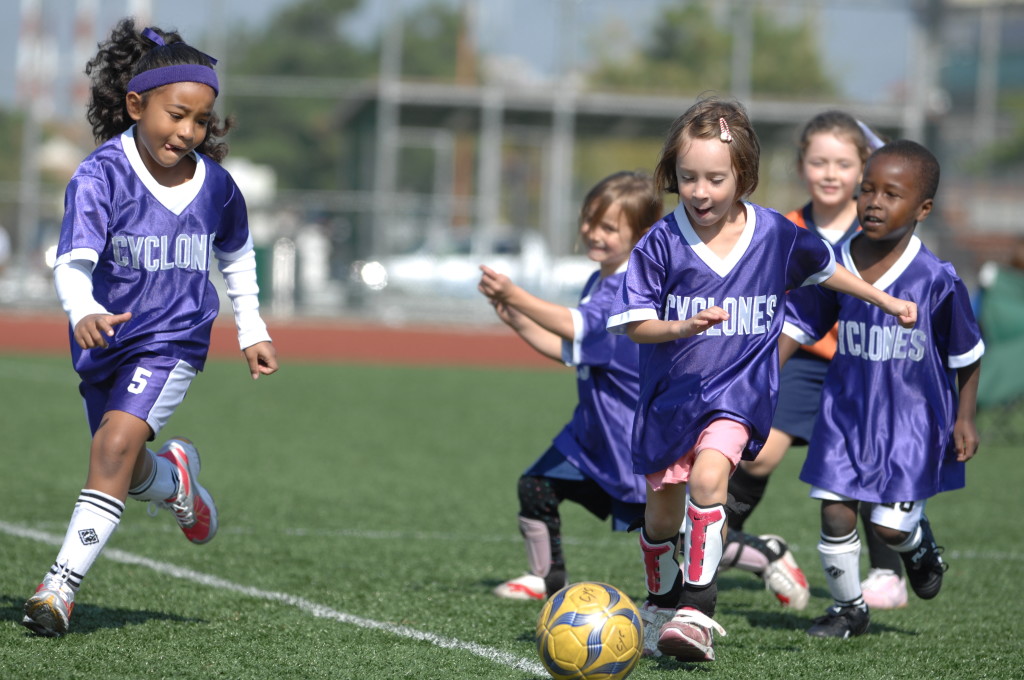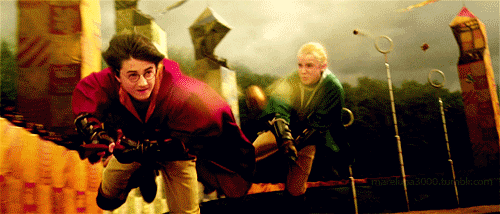Last year, I decided we should introduce some kind of sports to our five-year-old. It goes entirely against my theatrical personality, and my husband’s nerdy one—as neither of us has a sporty bone in our bodies—but I felt guilty because, well, what if our son was a natural, a real ball-playing fool, and we never gave him the opportunity to find out? Plus I was desperate for an outlet for all his energy, so we signed him up for soccer at the YMCA. All the europeans seem to be into it, and it sounded kind of like the muggle version of Quidditch. And so I became a soccer mom . . .
I’d been to exactly two soccer games in my life and I’d seen Invictus, so I felt pretty confident that I knew the rules. 1) There is a ball involved. 2) You’re supposed to kick it. 3) You’re also supposed to hit it with your head. Really, what more did a five-year-old need to know? For his first practice, his dad and I both took him, dragging his poor three-year-old sister along to support her brother. We assumed it was a family event, and we would need to cheer for him. (Not that we knew HOW to cheer for him, but we’d practiced a few that sounded pretty good the night before: “GO!” “Excellent feet!” “Great…running!” “Score a unit!” We were definitely ready for this.) It turned out only moms were there that first day—and a few bored older siblings who slunk off to talk Minecraft with one another. My husband took our very antsy daughter to the swings while I chatted with the moms. Oddly, there wasn’t any need for the cheers I’d practiced. When I glanced at my son running and kicking in the distance, he seemed happy and at ease. “This is going to be a breeze!” I congratulated myself, leaning back in the grass.
Their first game was that very weekend—which seemed soon even to me. Didn’t they need a bit more rehearsal before their performance? But it was only five-year-olds after all, and our son’s coach seemed super laid-back. The only instruction I’d heard him give the kids was to “have fun guys!” while he gave them all high-fives and let them hang from his arms and back. When the game started, we quickly learned that this time, entire families were there and all of them were cheering. Fortunately, Lance and I remembered our cheers from earlier in the week and were prepared to start cranking them out at natural intervals. However (as surprising as this is), the other parents’ cheers sounded so much better. “Good try, Noah!” “Nice block, Emma!” “Way to be there, Jack!” and my favorite, “Good hustle, team!” Good HUSTLE! (If you’re wondering—like I was—apparently, they didn’t mean it in the hip-hop “I’m a hustler” way—but rather as another way of saying “hurry.”)
We were all clapping and cheering and laughing at our cute kids—some of whom were chasing the ball and/or kicking it, some of whom were missing the ball and kicking other kids’ shins, and some of whom were turning pirouettes in the middle of the field while the rest of the clump of kids ran right by them. “Get in there, Ashley!” one parent called suddenly. “BE AGGRESSIVE!” “Be what?” I whispered to Lance. He rolled his eyes at me, confirming my suspicions. Now, I know it’s a BALL game where one plays with a BALL and that makes people feel all kinds of emotions (or so I’ve heard), but here was a parent yelling at her kid to DO exactly what we have tried so hard to help our son STOP doing. And for what? Something about that did not sit right with me at all.
Over the following weeks, we got really good at cheering. In addition to adopting “GOOD HUSTLE” as my main form of sideline encouragement, I found myself also yelling, “The ball! Don’t forget to pay attention to the ball!” to my daydreaming son, who could often be seen standing with a blank look on his face as the ball rolled by. Other parents grew bolder still with their own children. By far the most talented of the team’s players was a tiny little boy whose father rarely praised but often criticized. It was never overtly mean, but it still felt wrong somehow—at least to me, someone new to the whole “soccer mom” thing. What IS it about children playing ball that turns nice, normal parents into raging jerks, I wondered.
Yet, as the season wore on, I found myself wrapped up in my own son’s performance. Still annoyed whenever anyone yelled at his or her child to “BE AGGRESSIVE” or shouted with a harsh voice, I had to bite my tongue whenever I saw my own son gazing at the sky or kicking the ball the wrong way. I couldn’t tell you who won or lost any of the games, or by how many points, so it wasn’t about winning or losing. (I didn’t see how that mattered, and to be honest we tried to downplay the score keeping. “We lost,” Noah would say with a disappointed-sounding voice. “Did you have fun??” we’d counter.) I still held the same general lack of enthusiasm about sports that I had before my son started playing soccer. What I realized is that, for the first time, I was learning that my son will not always be excellent at everything.
It was strange. Technically, I have no desire for my children to play sports in college or professionally, so in theory I don’t care if they even play sports now. I certainly don’t care if they’re any good at kicking or throwing or hitting a ball. But what I realized is that I felt responsible for my son’s playing—even a little bit like it reflected poorly on us when he walked away from the goal he was supposed to protecting or ran up to the ball but then stopped and stared at it instead of kicking it. I’d heard stories of “soccer parents” who lived vicariously through their kids, and I thought that was laughable, but I hadn’t been prepared to feel like my son’s performance was a reflection of my parenting. It was particularly hard to see him trailing along behind or tackling a teammate during a game or turning somersaults on the field when other kids were so much more alert, so much faster, so much better than my son. There was this sudden and unexpected thirst to prove my own good parenting amongst these practical strangers, and there was no way to prove it except for through my son’s ability to perform well and be a “good team player” during a soccer game.

I’m glad I realized it, because I was (mostly) able to check my impulse to urge him to do one thing or another from the sidelines. Instead I worked on sticking to my encouraging cheer repertoire. I can’t help but wonder, now that the season is over and a little trophy of a plastic golden boy kicking a plastic golden ball sits on my son’s shelf, how often we parents admonish or praise our children because we forget that they are not merely projections of us. I learned a very important lesson during my first year as a “soccer mom.” My children are people—not extensions of me. They have their own thoughts, desires, and goals, and I (as their parent) have to lay aside my need to prove who I am through my children. Maybe my kids won’t be athletes, and I’m easily okay with that. (More than okay with that.) But am I okay with them not being musicians, not loving theater, not caring much for art? Am I okay if they vote against my beliefs or decide not to go to college or decide they don’t want a family and thus never provide squeezable grandchildren?
Because in the end, it all amounts to the same thing. I have to learn NOW how to be their champion—no matter where life takes them. I’m not meant to be criticizing from the sidelines or trying to manipulate them into the beings I think they should be. I won’t agree with—or even understand—every decision they make, but I have to learn now how to bite my tongue and stick to my encouraging cheer repertoire. Maybe a loving, “Don’t forget to pay attention to the ball!” every once in awhile is alright. In the meantime, for all sports-related things in the future, I think I’ll mostly be sticking to “GOOD HUSTLE.”
















